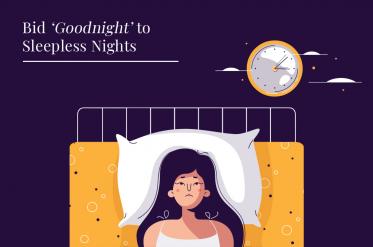What kind of Sleeper are you?

Sleep is essential to good health but did you know that your productivity is also linked with your quality of sleep? Also known as Sleep Chronotype, these sleeping behaviors define your energy levels throughout the day and your quality of sleep at night. While your bedtime routine is affected by several factors like calming lights, cool cotton bed sheets and soft décor, it’s always a good idea to know what your sleeping type is.
You can learn how to get a better sleep when you know your sleeping behavior and hence, improve your lifestyle.
There are four types of sleepers. Knowing your type helps you find out when you are most productive in the day. These types are based on animals' sleep and wake behaviors. The four kinds of sleepers are:
1. Bear – Happy go lucky and heavy sleeper

Most people tend to be bear when it comes to sleeping behaviour because their waking up and sleeping routine tends to be based on the Sun.
If you identify yourself as a Bear type of sleeper then you find it easy to sleep early and wake up on time with little to no problem. You find you are most productive before noon.
Bear Sleepers:
- Makes up about 55% of the population
- Early to bed early to rise sleep type
- Feels lethargic without 8 hours of sleep
- Extrovert, enjoys conversation and good in coordination
- Needs 8 hours of sleep to function
- Well with traditional office hours
- Struggle with social life in the evenings.
2. Wolf – Creative and insomniac

Also known as insomniac, the wolf sleeper type tend to find it difficult to wake up in the morning, but feel energetic when they wake up later. They are at their best at noon and their peak productive performance ends about 4 hours later.
Wolf Sleepers:
- Makes up to 15% of the population
- Classic night owl, creative and introverted
- Wakes up late, falls sleep late
- Most productive in the late evenings
- Actors, authors, musicians, and artists tend to be wolf sleeper
- Don’t work well during office hours
- Struggle with early morning meetings
3. Lion – Charismatic and early sleeper

The lion type of sleeper is early to bed and early to rise with their performance at its peak till noon. Their bedtime tends to be around 9 PM to 10 PM.
Lion Sleepers:
- Makes up to 15% of the population
- Early-bird, they tend to wake up between 4.00 AM to 5.00 AM
- Most productive in the morning
- Highly organized thinkers and doers
- Are in a high management position
- They like to make lists
- Struggle with social life in the evenings.
4. Dolphin – Intelligent and light sleeper

Can you change your sleeping type?
Each sleeping type has advantages and disadvantages. It is difficult to change your sleeping behavior but it is not impossible. You can gently but consistently move toward a healthier sleeping lifestyle by adopting good eating and sleeping habits and reducing unwanted stressors.
For example, if you identify as a Wolf type of sleeper you can jumpstart your day with a high protein breakfast to feel more energetic. Similarly, if you’re a Bear type of sleeper, you can go for a brisk walk when you feel lethargic after lunch to maintain your energy levels.
If you want to change your sleeping type, improve your health and overall wellness, create a sleeping environment conducive to peaceful sleep. Bedroom furniture, decors and most importantlybed sheets are important factors to better sleep health.
Is there any difference between Circadian Rhythms vs. Chronotypes?
Yes, there is a difference between Circadian rhythms and Chronotypes. Both guide you to understand your sleeping patterns and consequently improve your sleep health.
Circadian Rhythm
- It is controlled by the brain that makes you feel when to sleep and wake up
- It is lowest between 2 AM and 4 AM
Sleep plays an important role in helping you perform your daily tasks. That’s why lifestyle changes that prioritises your sleep is important. Several research suggests that the quality of your sleep affects your learning, moods and judgement.


 United Kingdom
United Kingdom United States
United States United Kingdom
United Kingdom Canada
Canada Australia
Australia















